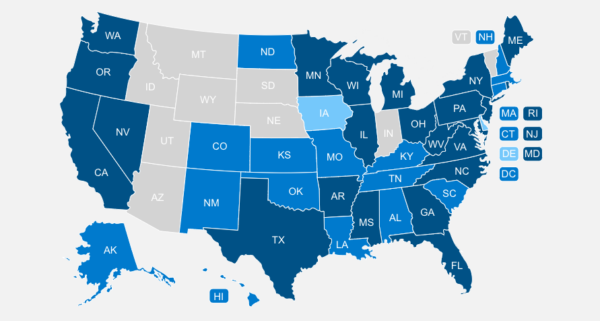
New Florida Law Limits Charitable Donations from Foreign Sources
July 28, 2025
How to Start a Nonprofit in Alaska: A Step-by-Step Guide for Beginners
August 26, 2025How to Start a Nonprofit in Alabama: Step-by-Step Guide for Beginners

Whether you dream of feeding the hungry, supporting education, or protecting the environment, starting a nonprofit in Alabama can transform your vision into reality. However, the journey from idea to operational nonprofit requires careful planning and precise execution.
Many aspiring founders feel overwhelmed by the complex legal requirements and paperwork. Specifically, understanding state regulations, filing correct documentation, and securing tax-exempt status can seem daunting at first. That’s why working with experienced partners like Labyrinth, Inc. can make nonprofit compliance easy. With Nonprofit Compliance Specialists who each bring 15+ years of nonprofit leadership experience, Labyrinth provides 1-on-1 support to ensure your organization starts on solid ground—backed by a 100% money-back guarantee on 501(c)(3) approval.
Ready to make a difference in your community? This comprehensive guide will walk you through each step of starting a nonprofit in Alabama, from initial planning to obtaining your 501(c)(3) status. Let’s turn your charitable vision into reality!
Planning Your Alabama Nonprofit
You’ve outlined community needs and drafted a mission statement. Now what? Let’s tackle the state filings that move you forward. With over 5,758 active nonprofit organizations in Alabama, understanding how to position your organization effectively becomes crucial.
Assessing Community Needs
Start by conducting a detailed needs assessment of your target community. We recommend gathering both quantitative and qualitative data through:
- Paper and web-based surveys
- Focus group discussions
- Key informant interviews
- Analysis of existing databases
- Community partner feedback
Additionally, research existing nonprofits serving similar causes. This helps identify service gaps and prevents duplicating efforts already underway. Furthermore, consider partnering with established organizations to expand their reach rather than creating a new entity if similar services exist.
Defining Your Mission
Your mission statement forms the cornerstone of your nonprofit’s identity. A powerful mission statement should be:
- Concise and focused
- Realistic and operational
- Inspirational and motivational
- Forward-thinking and positive
- Reflective of expected outcomes
When crafting your mission statement, involve board members, staff, donors, and community stakeholders in the process. The statement should clearly answer fundamental questions about:
- Who your target audience is
- What specific needs you’ll address
- How you’ll accomplish your goals
- Why your organization exists
Remember to keep your mission statement visible and regularly review it to ensure it stays relevant and aligned with your organization’s evolution.
Creating a Startup Budget
Developing a comprehensive startup budget requires careful consideration of filing fees and processing times. Initial costs for starting a nonprofit in Alabama include:
- Name reservation fee: $28
- State incorporation fee: $100
- County filing fee: minimum $50
- IRS 501(c)(3) application: $275 (Form 1023-EZ) or $600 (Form 1023)
- Alabama charitable organization registration: $25
State processing times vary, but expect:
- Name reservation: 1-3 business days for online filing
- Articles of Incorporation: 5-10 business days (expedited options available)
- IRS 501(c)(3) determination: 2-6 months for Form 1023-EZ, 6-12 months for Form 1023
Founders typically spend 20-40 hours completing formation paperwork independently. Working with professionals like Labyrinth can reduce this to just 2-3 hours of your time.
Beyond registration fees, briefly consider operational expenses like insurance, office supplies, and technology infrastructure. However, your immediate focus should remain on completing the formation process correctly.
Research grant opportunities and potential partnerships that could provide in-kind donations or shared resources to reduce initial costs. Moreover, consider leveraging volunteer support for administrative tasks and program work during the early stages.
Legal Requirements in Alabama
Name Reservation Process
Alabama stands apart as the only state mandating name reservation prior to filing formation documents. The process begins with securing your nonprofit’s name through the Alabama Secretary of State (334-242-5324, sos.alabama.gov).
The name reservation fee for online processing is $28 as of August 2025. Upon approval, you’ll receive a Name Reservation Certificate, essential for your Certificate of Formation submission.
Several naming guidelines must be followed:
- Nonprofits aren’t required to include “Corporation” or “Incorporated”
- Names using professional designations (engineering, mathematics) may require proof of licensing
- Banking-related names need approval from Alabama Banking Commissioner
- Insurance-related names require Alabama Insurance Commissioner’s approval
Navigating these state-specific requirements is where professional support proves invaluable. Our state-specific drop-off service ensures faster processing—particularly beneficial in Alabama where in-person filing can significantly reduce wait times.
Board Member Requirements
The state enforces guidelines for nonprofit board composition. According to Alabama law, every nonprofit must establish a board of directors. Key requirements include:
Director Qualifications:
- Must be natural persons
- No state residency requirement unless specified in bylaws
- No membership requirement unless stated in formation documents
Board Structure:
- We recommend a minimum of three directors for Alabama nonprofits to align with IRS requirements for 501(c)(3) status
- Quorum and term limits should be specified in the bylaws, but Alabama law does not set strict maximum term limits
Required Officer Positions:
- President
- Secretary
- Treasurer
The board holds responsibilities including financial oversight, organizational governance, fundraising, community representation, and strategic decision-making. For effective board composition, consider recruiting members who bring diverse backgrounds and expertise.
Board qualifications must be reasonable and lawful as applied to the organization. Exclusion based on criminal or regulatory sanctions may be allowed per law and IRS guidelines.
All corporate powers exercise under board authority, subject to limitations in articles of incorporation. Maintaining detailed documentation of board decisions through meeting minutes is important for legal compliance and organizational transparency.
Filing Formation Documents
Articles of Incorporation
The Certificate of Formation, also known as Articles of Incorporation, officially establishes your nonprofit in Alabama. This document must be filed with the Office of the Judge of Probate in the county where your registered office is located.
The filing process requires:
- Original Certificate of Formation plus two copies
- Name Reservation Certificate (mandatory attachment)
- Filing fee of $200 ($100 for state processing and $100 for county treasurer)
Your Certificate of Formation must include:
- Organization name
- Statement declaring member or non-member status
- Purpose statement (must include IRS-approved purpose clause for 501(c)(3) eligibility)
- Initial board of directors information
- Registered agent details
- Duration period (typically perpetual)
- Dissolution clause stating assets will be distributed to other 501(c)(3) organizations upon dissolution
With our fully managed services, you simply provide your organization’s mission and leadership details—we handle all document drafting, ensuring compliance with Alabama’s specific requirements. This end-to-end support continues through the entire formation process, including responding to any state correspondence.
Getting an EIN
After your Articles of Incorporation are filed with the state, apply for an Employer Identification Number (EIN) through the Internal Revenue Service. This nine-digit number serves as your nonprofit’s federal tax ID. There is no fee for obtaining an EIN.
We include EIN acquisition as part of our comprehensive formation services, eliminating another administrative task from your to-do list.
State Tax Registration
Once you secure your EIN, register with the Alabama Department of Revenue (334-242-1170, revenue.alabama.gov). This step ensures compliance with state tax requirements. Organizations with 501(c)(3) status receive automatic state corporate income tax exemption but must file for sales tax exemption if eligible, as sales tax is not automatically granted to all nonprofits.
Remember to maintain proper documentation throughout the filing process; amendments or corrections to formation documents typically require additional filings and may incur additional fees. Your secure SOC 2 Type II nonprofit client portal with Labyrinth stores all documents safely and provides real-time tracking of your formation progress.
Setting Up Your Organization
Establishing proper governance structures ensures your Alabama nonprofit operates efficiently. We emphasize the importance of following state regulations while setting up these foundational elements.
Writing Effective Bylaws
Alabama law requires written bylaws for all nonprofits, outlining your organization’s rulebook and governance structure. Your bylaws should address officer roles, board meetings/procedures, quorum requirements, and dissolution of assets for 501(c)(3) compliance.
A flexible bylaws template works well for startup nonprofits and can be revised as your organization grows. Our specialists craft bylaws specifically tailored to Alabama requirements and your organization’s unique needs, drawing on their 15+ years of nonprofit leadership experience.
First Board Meeting
At your initial board meeting, adopt the articles of incorporation, approve bylaws, elect officers, and authorize the opening of a bank account. Document all decisions and maintain meeting minutes for compliance.
Opening a Bank Account
To open a nonprofit bank account, you must provide the EIN, incorporation documents, adopted bylaws, and board resolution authorizing account opening. Ensure funds are not commingled with personal accounts, and appoint authorized signatories as recorded in the board minutes.
Obtaining Tax Exemption
Securing tax-exempt status represents a significant milestone for your Alabama nonprofit. Remember: forming your nonprofit does not automatically make it tax-exempt—you must apply separately to the IRS.
501(c)(3) Application Process
After incorporating with the state and obtaining your EIN, file IRS Form 1023 ($600 fee) or Form 1023-EZ ($275 fee, if eligible) to request federal tax exemption. The IRS will review your application, which can take several months. Upon approval, the IRS issues a determination letter certifying your organization’s 501(c)(3) status.
Navigating the IRS application process requires expertise and attention to detail. We support both 1023 and 1023-EZ filings, and our 100% IRS tax exemption approval guarantee provides peace of mind. If your nonprofit’s tax-exempt status was previously revoked, we also offer reinstatement support—using the same forms but with specialized expertise to address past compliance issues.
State Tax Exemptions
Once you receive your IRS determination letter, organizations with IRS 501(c)(3) status automatically receive exemption from Alabama state corporate income tax; a separate application for state income tax exemption is generally not required. However, sales tax exemption must be applied for separately through the Alabama Department of Revenue and is not granted to all nonprofits automatically.
For qualifying organizations, annual renewal is required to maintain sales tax exemption certificates. Some types of nonprofits (such as educational or religious institutions) may receive exceptions from certain registration and reporting requirements in Alabama.
Charitable organizations planning to solicit donations in Alabama must also register with the Attorney General’s office (334-242-7300, ago.alabama.gov). This is a separate filing from your tax-exempt status and requires annual renewal. Our bundled services include first-year fundraising registration, helping you maintain compliance as you begin accepting donations.
Ongoing Compliance Obligations
After receiving tax-exempt status, your nonprofit must maintain compliance through:
- Annual Form 990 filing with the IRS
- Alabama annual reports filed with the Secretary of State
- Charitable solicitation renewal if fundraising in Alabama
Essential documents to keep include EIN confirmation, bylaws, meeting minutes, Certificate of Formation, IRS determination letter, and tax exemption certificates. Maintaining proper records ensures continued compliance. Regularly check for changes in state and federal nonprofit requirements to preserve your organization’s tax-exempt benefits.
Starting a nonprofit in Alabama involves multiple steps and careful attention to state-specific requirements. With the right guidance and support—whether through comprehensive services like those offered by Labyrinth or through careful self-navigation—you can successfully establish an organization that creates lasting positive change in your community.


![Your 501(c)(3) Approval Guaranteed{{ include_custom_fonts({"Museo Sans":["Bold","Bold Italic","Regular","Regular Italic"]}) }}](https://no-cache.hubspot.com/cta/default/560178/interactive-194101957210.png)
![Start Your Nonprofit with Confidence{{ include_custom_fonts({"Museo Sans":["Bold","Bold Italic","Regular","Regular Italic"]}) }}](https://no-cache.hubspot.com/cta/default/560178/interactive-194101957151.png)








